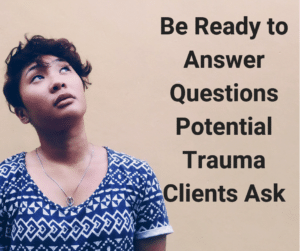Whether you are in private practice or working for an agency, having well formulated and confident answers to questions your potential trauma clients ask is half the battle to getting them through the door.
I have noticed that it is vitally important to help my potential trauma clients feel safe and secure as we talk about if my services are the right fit for them.

Below I will share some frequently asked questions and tips to answering them as well as some questions that you should answer even if the potential trauma client doesn’t ask them.
The Fine Tune
Over the years, I have continued to fine-tune my answers to frequently asked questions by trauma clients. If you have worked with any private practice coach or business designed to help you become successful in private practice more than likely you have heard about having scripts to use during the initial phone call or email. There are also scripts for the initial consultation. I don’t believe this is to sell a bowl of bologna to the clients, but it is to help the clinician be calm and confident during the conversation. As a trauma therapist, I think we can take something away from this practice. I believe that both of those characteristics, being calm and confident, are even more needed when talking to trauma survivors.
The Power of Safety
I started to realize along my niche journey that clients needed to know that I was going to be able to handle their thoughts, feelings, and behaviors and I wasn’t going to leave them in the “cold” to deal with it alone. The more I could assure them that I was competent, and I had a plan the more they seemed to be okay with working on the hard things that have happened in life. This is the power of safety in trauma treatment. Let’s explore some of the questions that you need to be ready to answer.
The Preparation
Sometimes I get potential clients who have several questions for me and sometimes I get potential clients who say they read all they need to know on my website. Either way, I think we need to be prepared to answer the questions they ask as well as some they may not know they need to ask. Below I will share a variety of both types of questions and some tips to consider when formulating your answers.
Questions they might ask:
-
What trainings do you have?
Tips: Be confident when talking about the level of training you have. Remind yourself that more than likely you have more than they do on the topic, therefore, you can be helpful. I know we all want more training and wish we had more training, but don’t let those thoughts and feelings show through in your answer.
-
What is your approach to trauma?
Tips: Be clear about how you see trauma and what your beliefs are about how it impacts a person bran, body, and over life. Talk about your beliefs and your approach to the treatment of trauma.
-
How often do I need to come to see you?
Tips: Be clear and direct when answering this question. Most trauma survivors like to know what to expect. For example, I ask all my clients to commit to four consecutive once a week appointments. Then I assess what I think is needed at that point moving forward in treatment.
Questions they might not ask, but you should answer anyway:
-
When will you know I am done?
Tips: Make sure to listen to the client when they tell you why they are pursuing therapy. Listen for pain points and then let them know that when those things are better that might be an indication that they are finished with therapy.
-
Is there homework or expectations outside of therapy?
Tips: Helping potential clients to know that there are expectations outside of the therapy room is important. This helps them to have an accurate assessment of what it is going to take to heal from trauma. I like to talk about the continuum of homework assignments I might give to let them know that sometimes work will be light and sometimes it might be a little heavier.
-
How are you sensitive to my needs?
Tips: I think it is important to help the potential client know that you are in this journey with them, so I take this opportunity to talk about my keen attunement to them throughout the therapy process. You want to make sure to let them know that it won’t be easy, but it also should not be impacting their daily life to the point of not being able to function. I like to encourage clients to give me feedback on how things are going for them outside of the sessions.
These by no means are all the questions that potential clients might ask, but just a few that might help you become ready. I believe that answering a potential trauma client’s questions with a sense of calm and confidence really helps them to feel safe and secure. I encourage you to take time to formulate your answers to these questions. Then find a friend or colleague to roleplay with. The more practice we have the better prepared we are.
Comment Below:
What are some other questions you have heard from potential trauma clients?

